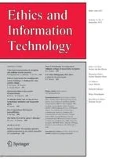Abstract
My anthropological analysis of bionics is basedon the representations of engineers concerningthe definition of humankind and its future. Thedifference between repairing and improving onhuman beings is disappearing and we strive toreach a kind of `perfection', whose criteriaare evolving with technical developments.Nowadays, in the so-called information society,information is described as the best value: aperfect human being would be a free braindirectly connected to the web, and without abody because it is considered as an impedimentto the circulation of information. But what isconsidered as good today won't be good enoughtomorrow. And `improving' the human being moreand more could make it evolve into a verydifferent human being, or even into a newspecies: post-humankind. For some people, thisis not a problem, because the goal is to be`better' than we are, human or not. As for me,I think that we risk losing something veryimportant: our social ability.
Similar content being viewed by others
References
Jean Baudrillard. La société de consommation. Denoë Folio, Paris, 1970.
Jean Baudrillard. The Virtual Illusion: Or the Automatic Writting of the World. Theory, Culture and Society, 12: 97–107, 1995.
Daniel Bell. Vers la société post-industrielle. Laffont, Paris, 1976.
Henri Bergson. L'évolution créatrice. Alcan, Paris, 1928.
Philippe Bernard. De l'utopie moderne et de ses perversions. PUF, Paris, 1997.
Gérald Berthoud. Entre la règle de l'intérét et la récessité du sacrifice. Revue du MAUSS, 5: 101–117, 1995.
Daniela Cerqui. L'“extériorisation” chez Leroi-Gourhan. Institut d'anthropologie et de sociologie, Lausanne, 1995.
Daniela Cerqui. De la mémoire extériorisée à la mémoire prothétique. Revue européenne des sciences sociales, 111: 157–169, 1998.
Daniela Cerqui. Comment le réseau vint aux hommes: la virtualité est ailleurs. Tsantsa, 5: 20–27, 2000.
Antonio Damasio. Descartes' Error: Emotion, Reason, and the Human Brain. Putnam, New York, 1994.
André Delaporte. Idée d'égalité, thème et mythe de l'âge d'or en France au 18e siècle. History of European Ideas, 14: 115–136, 1992.
Mark Dery. Vitesse virtuelle. Abbeville, Paris, 1997.
Wilson Dizard. The Coming Information Age. An Overview of Technology, Economics and Politics. Longman, London, 1982.
Arturo Escobar. Welcome to Cyberia. Notes on the Anthropology of Cyberculture. Current Anthropology, 35: 211–231, 1995.
John Feather. The Information Society. A Study of Continuity and Change. Library Association Publishing, London, 1988.
Brigitte Fourastié. L'infrastructure rationaliste. Société, 53: 263–274, 1996.
Michel Foucault. Surveiller et punir: la naissance de la prison. Gallimard, Paris, 1975.
Michel Foucault. Résumé des cours (1970-1982). Julliard, Paris, 1989.
Arnold Gehlen. Anthropologie et psychologie sociale. PUF, Paris, 1990.
Marc Guillaume. L'empire des réseaux. Descartes, Paris, 1999.
Stuart Hampshire. Biology, Machines, and Humanity. In James Sheehan and Morton Sosna, editors, The Boundaries of Humanity. Humans, Animals, Machines, pages 253–256. University of California Press, Berkeley, 1991.
Geneviève Heller. “Tiens-toi droit!” L'enfant à l'école primaire au 19e siècle: espace, morale, santé. L'exemple vaudois. Editions d'En bas, Lausanne, 1988.
Gilbert Hottois. Essai de philosophie bioéthique et biopolitique. Vrin, Paris, 1999.
Hans Jonas. Le principe responsabilité. Cerf, Paris, 1990.
Hans Jonas. Pour une éthique du futur. Payot, Paris, 1998.
Rheinart Koselleck. Le futur passé. EHESS, Paris, 1990.
Dominique Lecourt. Contre la peur: de la science à l'éthique, une aventure infinie. Hachette, Paris, 1990.
Sylvie Lelièpvre-Botton. L'essor technologique et l'idée de progrès. Ellipses, Paris, 1997.
Edouard Le Roy. Les origines humaines et l'évolution de l'intelligence. Boivin, Paris, 1928.
André Leroi-Gourhan. Le geste et la parole I. Technique et langage. Albin Michel, Paris, 1964.
André Leroi-Gourhan. Le geste et la parole II. La mémoire et les rythmes. Albin Michel, Paris, 1965.
Pierre Lévy. La cyberculture en question: critique de la critique. Comment peut-on être anticapitaliste? Revue du MAUSS, 9: 109–129, 1997.
Marshall McLuhan. Pour comprendre les médias: les prolongements technologiques de l'homme. Seuil, Paris, 1968.
Tomas Maldonado. Reale e virtuale. Feltrinelli, Milano, 1992.
Maurice Merleau-Ponty. Phénoménologie de la perception. Gallimard, Paris, 1945.
Marvin Minsky. La fusion prochaine de la science, de l'art et de la psychologie. Art Press Hors série, 12: 140–144, 1992.
Christian Miquel and Guy Ménard. Les ruses de la technique. Le symbolisme des techniques à travers l'histoire. Boréal, Montréal, 1988.
Howard Rheingold. The Virtual Community: Homesteading on the Electronic Frontier. Addison-Wesley, Reading, 1993.
Günter Ropohl. Information Does not Make Sense; or: The Relevance Gap in Information Technology and Its Social Dangers. In Carl Mitcham and Alois Huning, editors, Philosophy and Technology II. Information Technology and Computers in Theory and Practice, pages 63–74. D. Reidel Publishing Company, Dordrecht, 1986.
John Searle. Le mystère de la conscience. Odile Jacob, Paris, 1999.
Allucquère Rosanne Stone. Will the Real Body Please Stand Up? In Michael Benedikt, editor, Cyberspace: First Steps, pages 81–118. MIT Press, Cambridge, 1991.
David Tomas. The Technophilic Body: On Technicity in William Gibson's Cyborg Culture. New Formations, 8: 113–129, 1989.
Paul Virilio. La vitesse de libération. Galilée, Paris, 1995.
Max Weber. Le savant et le politique. Plon, Paris, 1959.
Norbert Wiener. Cybernétique et société. Deux-Rives, Paris, 1952.
Author information
Authors and Affiliations
Rights and permissions
About this article
Cite this article
Cerqui, D. The future of humankind in the era of human and computer hybridization: An anthropological analysis. Ethics and Information Technology 4, 101–108 (2002). https://doi.org/10.1023/A:1019940127052
Issue Date:
DOI: https://doi.org/10.1023/A:1019940127052




